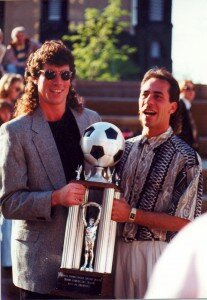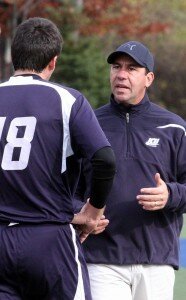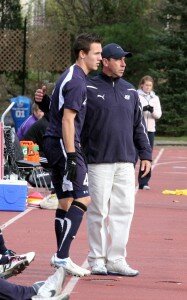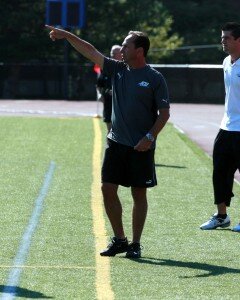Hector Marinaro is a special player and coach who has done it all.

Marinaro is joined by fellow legend Otto Orf as they celebrate a championship in Cleveland (Photo Courtesy of Otto Orf)
He is a legend in the indoor game, finishing as the all-time leader in points and goals for all of professional indoor soccer. He had an jaw-dropping 1,223 goals and 701 assists over the course of a 21-year playing career, 16 of which were spent in Cleveland. He was the MISL scoring champion nine times along with being named an All-Star a whopping fifteen times. Marinaro won the league MVP award so many times (seven) that they named the award in his honor. This was yet another record in American professional sports.
His colleagues, including fellow indoor soccer legend Otto Orf, are quick to praise Marinaro’s career.
“Hector has always been a special player, but more than that he was a pure ball striker and the most natural finisher the indoor game has ever seen. If they pick up a fraction of his gift the team will have great success!”
He successfully joined the coaching ranks in 2002, pulling double-duty as a player-coach with the Cleveland Force until 2004. He would then be named the head coach at Division III side John Carroll University in 2006. He’s had similar success at JCU, winning the OAC Tournament Championship in 2007 and leading his squad to the OAC semifinals five times and the championship match three times.
Marinaro was named the head coach of PASL expansion side Cleveland Freeze in September, giving a new franchise instant credibility.
“Having Hector Marinaro join the coaching ranks of the PASL is tremendous,”PASL Director of Operations Sydney Nusniov commented. ”If you look at some of the coaches in our league now you have Marinaro in Cleveland, Tatu in Dallas, Richard Chinapoo and Gino DiFlorio in Harrisburg, Bernie Lilavois in Ontario, Genoni Martinez in Monterrey, Mariano Bollella in Hidalgo and on and on it can only help develop the game when you have that kind of talent that you can tap as a resource. Not only can they teach the sport, but they give younger players something to aspire to.”
Teaching, inspiring, and guiding a new generation of student-athletes and pros is a mission for Marinaro.
And it is a mission accomplished, according to former JCU striker Jeffrey Kosek.
“Coach Hector Marinaro instilled values of assertiveness when holding strong belief, respect for all involved in the program, as well as the importance of positive team chemistry. He developed in players a winning mindset and attitude, and served as a player’s model for carrying himself on and off the field.”
Becoming a model coach wasn’t always an easy task for Marinaro.
“As a player, you can make a pass, make a tackle or score goal that has an immediate impact on the game. It was a little frustrating early in my coaching career to be on the sidelines and not to be able get out onto the field. As a competitor, I wanted to be on the field, but I have learned to trust my players and trust that they will get the job done.”
They have done just that and more thanks to the values that Marinaro passed along.
“The overall team concept is more important than the individual. In order for a team to be successful, everyone needs to buy into the team first concept. Just like in soccer, your success in the real world will depend on others.”
The legendary player is always looking for his next challenge. Being a head coach for a new indoor franchise and at a D-III college certainly fits into the challenge category, but Marinaro always looks for the positives.
“In Cleveland, indoor soccer as we know it with the boards has kind of gone by the wayside. We used to have 10-15 indoor facilities that played indoor soccer with the boards. Most of those facilities have gotten rid of the boards and are now just soccer facilities with kids training for outdoor soccer. We need to bring back the excitement of true indoor soccer back to the fans that used to love it back in the 90’s here in Cleveland.”
Marinaro added the the D-III level is great for student-athletes that want to get a great education while continuing their soccer careers. He admits it can sometimes be a challenge to balance education and soccer.
“My rule as a coach at the DIII level is that if you have a class and practice at the same time, you go to class. The level of kids we get at JCU is tremendous. They have their heads on straight and realize that their education is what’s most important for their future.”
He clearly has a passion and love for the game, but cares just as much for his players and what happens next in their life journey. While not many D-III players make it to the next level in terms of soccer, many make it big in the world of business and education. Marinaro has seen many leaders emerge in his eight years at John Carroll and is proud of his players’ achievements on and off the pitch.
Marinaro also understands the big picture in the sport and truly knows what we need to do to get to the next level of footballing nations.
“We all know that America develops the best athletes in the world. Unfortunately, all the top athletes are playing football, basketball, and baseball because those are the top sports in America and they get the most exposure. Soccer is very much a suburbia sport where parents pay top dollar for their kids to play at the best clubs in their area. Therefore, a lot of inner-city kids don’t get exposed to the game of soccer and the opportunity to play for the top clubs in their respective region. We need to find a way to get the best athletes playing and training from a young age and then not lose them to the ‘big three’ when they reach their formative years. In pretty much every country in the world outside of the U.S. and Canada, most of the top athletes are playing soccer as a way for a better life for them and their families. In the U.S., they see football, basketball, and baseball as their ticket to stardom and a better life.”
This is an argument that has been made for years, but hasn’t gotten much attention from the upper levels of U.S. Soccer. All of us need to do more to make the beautiful game more accessible and more attractive to all athletes.
Playing a fast, fun, and high-scoring version of the game certainly can’t hurt. Futsal or traditional indoor soccer both can do the trick.
“In outdoor soccer, a player that is not technically sound can be hidden on the field. In indoor soccer, that same player will be exposed really quick. I like to play 2-3 touch soccer and in order to do that you need to have a good to great first touch. Indoor soccer forces you to play quickly and technically which translates into great outdoor players.”
So Marinaro emerges as yet another great coach that is making an impact on the game and his players’ futures, whether that future is on the pitch or in a classroom or in a corporate boardroom. The lessons Marinaro has taught will certainly apply in everyday life.
The beautiful game is lucky to have Hector Marinaro as a steward for the sport we all love.
We wish him well in finishing out the collegiate season and beginning a new chapter in the PASL!
Korrio understands it is your passion for coaching kids that drives you. We also know that the less time you spend dealing with administrative, communication and automation hassles, and the more time you spend on the field, the happier you’ll be. And because you play a crucial role in our children’s lives, we want you spending as much time as possible coaching our kids. Korrio offers a modern approach to coaching by allowing new ways to communicate and develop a community on and off the field. Congratulations to the ISN Star of Coaching this month.



